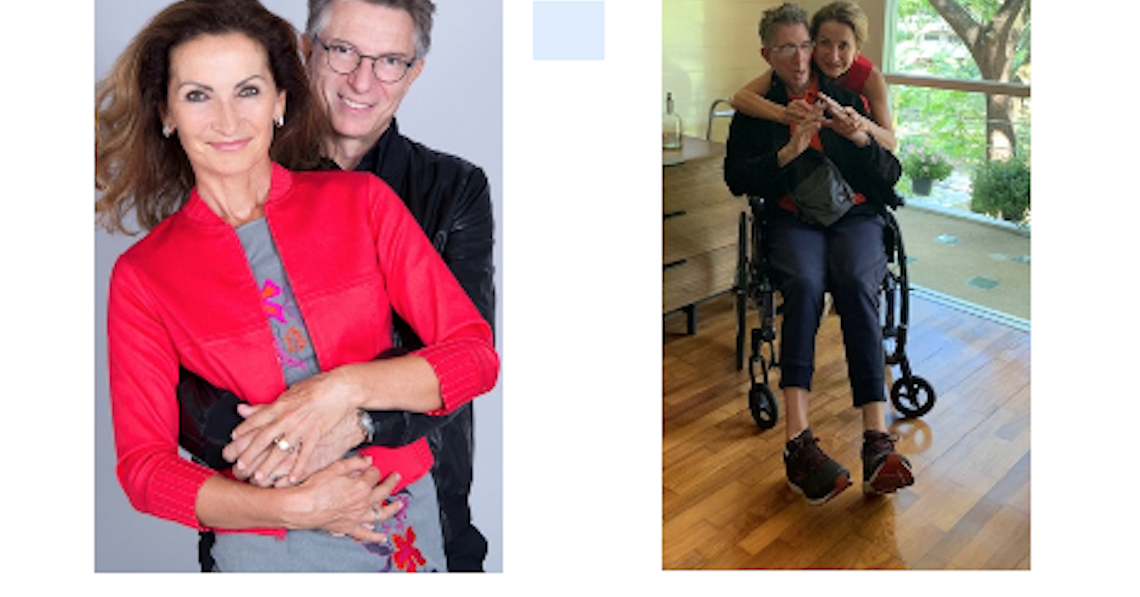On the morning of September 18, 2019, the world was still perfectly ordinary. The sun was shining over Zurich, coffee scented the kitchen, and I was preparing dinner for friends later that evening. Martin, my husband, was working at his laptop in the next room. Then came the words I will never forget:
“Gypsy, something is wrong with me.”
Within seconds, Martin collapsed. His arm went limp, his voice disappeared. A massive stroke.
The Swiss system responded exactly as one would expect: the ambulance arrived in minutes, doctors performed emergency surgery, machines beeped and blinked on the ICU. Switzerland’s acute care was flawless. And yet, that was only the beginning of our story.
Falling through the cracks
Martin survived. He was still Martin—alert, witty, full of curiosity—but his body refused to follow. He couldn’t walk unaided, couldn’t speak more than fragments, couldn’t swallow easily.
That’s where we discovered the blind spot of even the most advanced systems. Rehabilitation clinics wanted “progress” to justify treatment. Nursing homes were designed for dementia patients, not for a brilliant neuroscientist who simply needed everyday support.
We fell through the cracks.
Day after day I fought: for therapy sessions, for equipment, for recognition that Martin was a person, not a case file. And with every conversation, my confidence in the system shrank. We were in one of the wealthiest countries in the world – yet my husband’s dignity was slipping away.
The painful paradox of insurance
Adding to the struggle was something few people talk about: Switzerland’s rigid insurance rules. By law, every resident must carry Swiss health insurance. But if you leave the country, you lose it—you cannot take it with you.
For healthy retirees dreaming of moving abroad, this is already a burden. For Martin, it was devastating. After his stroke, finding an international insurer willing to accept him without exclusions was nearly impossible. Exactly when he needed security most, the safety net tore beneath us.
The radical decision: Chiang Mai
After months of frustration and exhaustion, I made a decision that many of our friends considered reckless: we would return to Chiang Mai, Thailand, where I had lived years earlier.
Some said: “You don’t take a severely ill man to a developing country.”
But my intuition whispered something else: maybe Thailand had what Europe had lost.
And I was right.
“Martin’s angels”
Those first weeks in Chiang Mai were chaotic—doorways too narrow for the wheelchair, sleepless nights, the terror of a fall. But then something shifted. We met Pha Sai, a young Thai-Burmese woman who became Martin’s first caregiver. She didn’t just “do her job”—she saw him. She noticed when he was restless at night, laughed at his sly jokes, held his hand when words failed.
Soon others joined: Ni, who brought her Taekwondo strength; Chaa, who cooked nourishing meals; Jeely, who radiated calm. Together they became “Martin’s angels.”
They didn’t measure progress in statistics but in smiles. They didn’t see a stroke patient—they saw Martin.
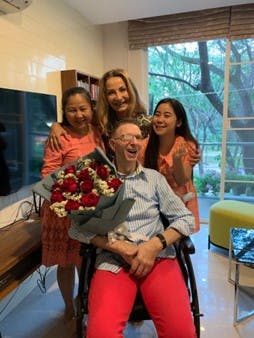
Life beyond statistics
With this team, our life began to bloom again. We listened to live jazz at Khun Dang’s club, Martin’s face lighting up at every trumpet note. We made small excursions—to elephant camps, to concerts, to dinners in beautiful restaurants. Everywhere we went, we were welcomed.
Strangers would approach our table, often unable to speak English but expressing through gestures and warm smiles how glad they were to see Martin out and part of life. That sense of welcome and belonging was everywhere, a cultural embrace that carried us through difficult days.
At home, friends visited, birthdays were celebrated, and once Martin even arranged for 150 roses—one for every month of our love—to fill the room with red.
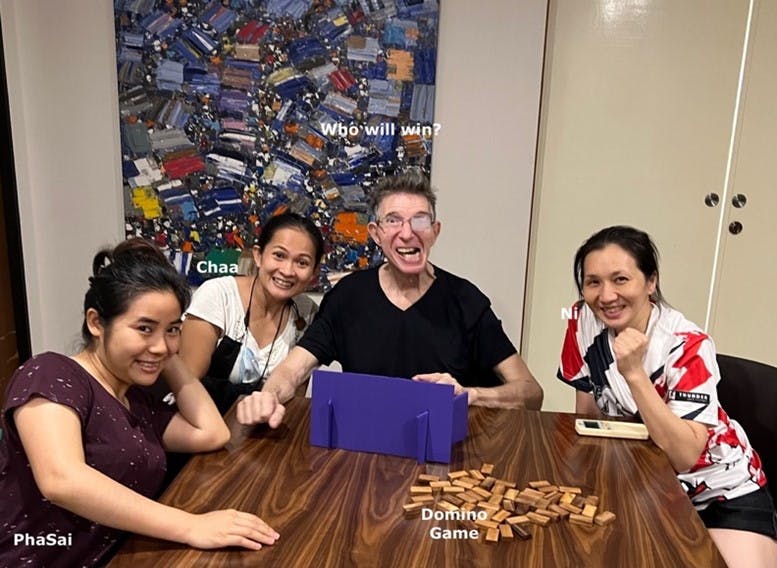
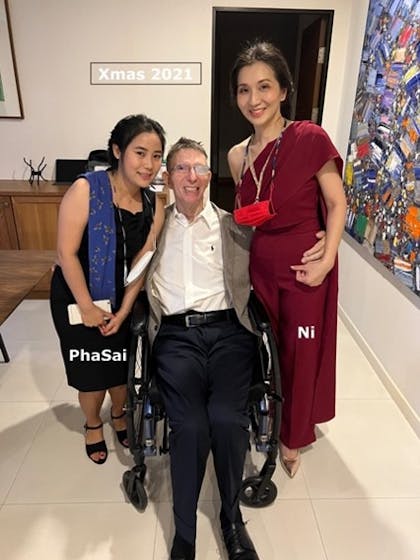
Switzerland had offered efficiency. Thailand offered life.
A culture unafraid of endings
Martin passed away in April 2022. But even in those final weeks, Thailand shaped the experience in a way that I will never forget. Monks came to our home to chant. Friends and angels kept vigil around his bed, massaging his hands, telling stories, singing softly. When he left his body, it was peaceful, dignified, full of love.
At Chedi Luang temple, prayers echoed. On the Ping River, we scattered his ashes with jasmine flowers and lotus petals. It was sorrowful, but also beautiful—a farewell that celebrated life rather than fearing death.
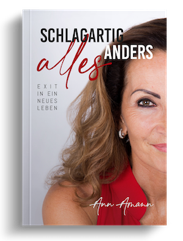
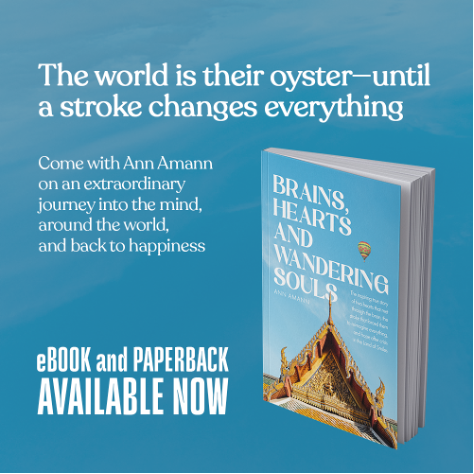
Why this matters
On World Stroke Day (October 29) and on the Day of Family Caregivers (October 30), my story is more than personal. It is a mirror.
It asks: what do we really mean when we talk about “developed” countries? Switzerland and Germany have extraordinary hospitals, yes. But they are often trapped in categories, statistics, and costs. Thailand may have fewer resources, but it has something that cannot be bought: humanity, continuity, and respect for life until the very end.
That is something to be deeply proud of.
What I learned
- Care is not only about medicine. It is about being seen.
- Community heals. A circle of caregivers, neighbors, and friends created a life worth living.
- Dignity matters more than length of days. Martin’s last years were not defined by what he couldn’t do, but by the joy of what he still could.
A love letter to Thailand
My book Brains, Hearts and Wandering Souls (German title: Schlagartig alles anders) is my attempt to capture this paradox: that we had to leave one of the richest countries in the world to find humanity where others least expected it.
Thailand gave my husband back his dignity. It gave me back hope. And it showed us both that quality of life is not about wealth, but about warmth.
For that, I will remain forever grateful.
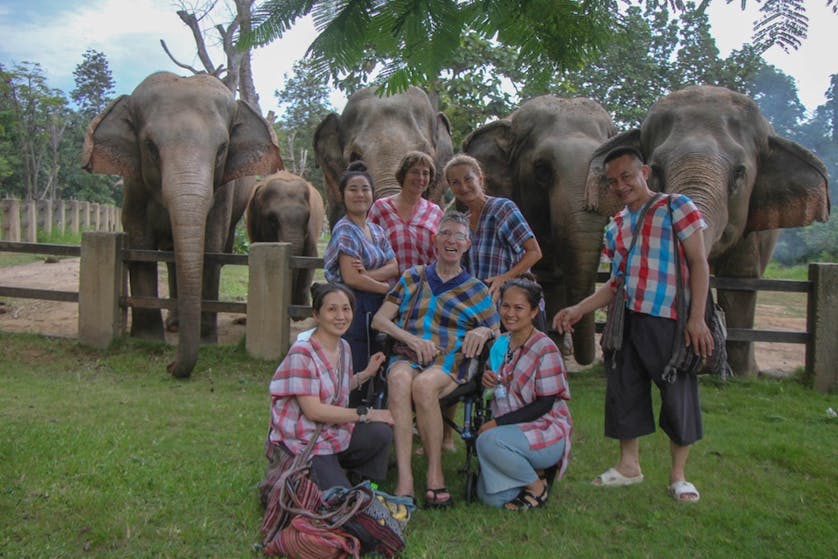
About the Author:
Ann Amann lives in Zurich and Chiang Mai, Thailand. She wrote a book about the two most intense years of her life. It is the life story of a strong woman who, although coming from a petit-bourgeois background, moved to the “Gold Coast” of Zurich after her marriage, had two children and fulfilled almost everything that was expected of her. After her divorce, she built up a business in tourism and met her great love Martin at the end of her forties.
Suddenly everything changed and she faced the most difficult situation in her life – she was forced into a Life Change. Transformed through the knowledge and Resilience she gained by practicing Buddhism Philosophy and her Life in Asia, she fought unconventionally and courageously back to a life of Happiness. She shares her journey/experiences between the two worlds of Zurich and Chiang Mai, Thailand. Ann wrote an inspirational book, about Quality of Life, when we have the courage to deal with the fact that each of us can face a great crisis in life and then … ? Is that the end? Or do we give ourselves the chance to make it beautiful, albeit different.
